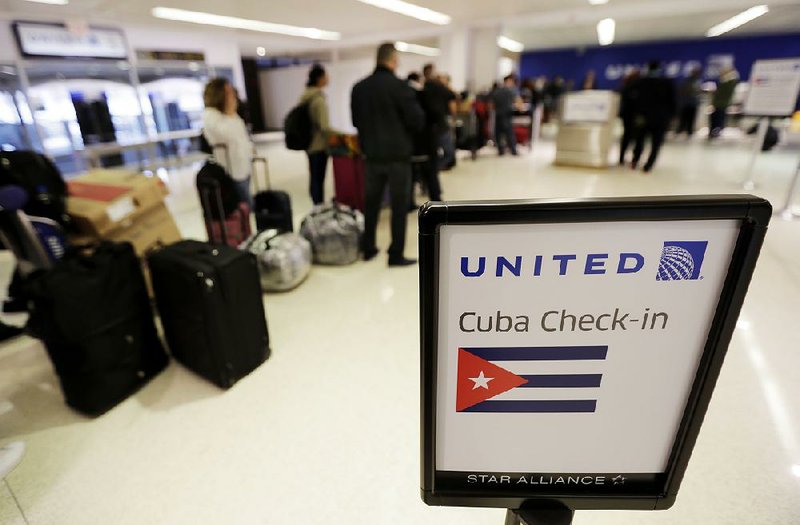U.S. airlines were ecstatic earlier this year when it was announced that commercial flights would resume to Cuba after more than 50 years, with one executive at a major carrier calling it almost a "once-in-a-lifetime opportunity."
Yet as U.S. airlines begin flights this week to Havana, the long-awaited travel surge to Cuba is already in doubt.
Citing weak demand, American Airlines Group Inc. trimmed plans for almost a quarter of its flights to Cuba early next year. And in a potentially crippling blow, President-elect Donald Trump is threatening to rescind new relaxed policies with the island nation, leaving the future of travel there in limbo. Already, Trump's comments have prompted some travelers to accelerate plans to visit Cuba before his inauguration or to delay them until he makes his policies clear.
"People are afraid Trump is going to close the border again, and then it will be impossible to go there," said Alexandre Chemla, founder of Altour, the largest independently owned U.S. travel agency. "It's a wait-and-see situation because of Trump and everything he said."
American's decision isn't related to Trump's potential pullback from Cuba, said Matt Miller, an American Airlines spokesman, noting that the carrier implemented its cut the weekend before the presidential election.
The uncertainty represents a stark turnaround from March when U.S. airlines sought permission to fly almost 60 daily round trips to Havana, triple the 20 daily frequencies authorized under the agreement between the U.S. and Cuba. They also applied for 10 daily round trips to each of nine other destinations on the island.
That followed President Barack Obama's executive orders last year clearing the way for travel agents and the public to book direct flights to the communist nation as long as travelers qualify under 12 accepted reasons for a visit, such as educational activities or visiting relatives.
Eight airlines, including American, began initiating service to Havana this week, with 500 flights to the city expected to have been completed by year end, according to the U.S. Department of Transportation. Flights to smaller Cuban cities began earlier this year. Any cutback to Cuba flights isn't likely to hurt the airlines' business in a material way.
When U.S. carriers sought permission earlier this year to offer flights to Cuba, Southwest Airlines Co.'s chief commercial officer, Bob Jordan, said, "the pent-up desire to be able to travel to Cuba is tremendous" after decades without commercial service.
"I wouldn't call this a once-in-a-lifetime opportunity, but it's pretty close," he said at the time.
In American's application for flights, Chief Executive Officer Doug Parker boasted that his airline had flown more U.S.-Cuban charter flights than any other carrier over the past 25 years. That means that American "is ready on day one to offer the benefit of a full schedule of reliable frequencies to Cuba," Parker said.
Now, his airline is the first to backtrack. It will cut daily round-trip flights between the U.S. and Cuba to 10, from 13, starting in mid-February because of lower-than-expected demand, Miller said. The company also will fly smaller jets on two routes, he said.
Other carriers, including Delta Air Lines Inc. and Spirit Airlines Inc., said bookings so far are in line with expectations. Southwest declined to comment. But airlines have kept fares low to fill seats, said Paul Berry, spokesman for Spirit, known as an ultra-discount carrier.
"When fares are as low as ours, that means there's a lot of capacity," Berry said.
United Continental Holdings Inc. isn't flying to Cuba from south Florida, where there's "an enormous amount" of flights and seats on such routes, Chief Financial Officer Andrew Levy said in an interview Tuesday. The Chicago-based airline is flying only to Havana, with daily service from Newark, N.J., and on Saturdays from Houston.
"From what I understand, it's going to take a really, really long time for that to become a Caribbean destination that's as popular as some of the other ones that are out there today," he said. "The infrastructure just isn't there. I'm personally skeptical about the opportunity."
Olga Ramudo, owner of Express Travel in the Miami suburb of Coral Gables, said she expects other airlines to follow American's lead and reduce service. There's too much seat capacity, she said, particularly since Cuba lacks the kind of hotels and transportation that U.S. travelers generally expect.
On Monday, days after the death of former Cuban President Fidel Castro, Trump reiterated on Twitter a campaign pledge that he will "terminate" Obama's new trade policies with the island nation unless it agrees to "a better deal."
Some investors speculated that Castro's death could pave the way for improved relations with the U.S. The $37 million Herzfeld Caribbean Basin Fund, which holds stock in airlines, cruise lines, builders and other companies that could gain if the U.S. lifts trade restrictions, climbed 9.4 percent Monday, the biggest increase in nine months.
But that is wishful thinking if Trump rescinds Obama's policies, said Erika Richter, spokesman for the American Society of Travel Agents. She said tighter restrictions could hurt a range of business interests in addition to airlines.
"We are trying to keep things as they are, where Americans have a right to travel anywhere on the globe," she said.
Information for this article was contributed by Michael Sasso of Bloomberg News.
Business on 12/01/2016
